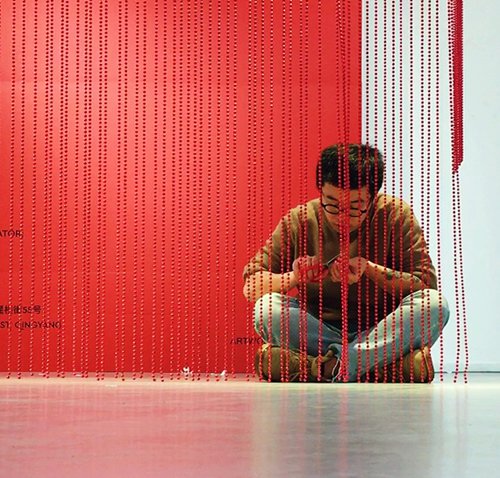
Wu Kangyang prepares for his art exhibition on World AIDS Day at Nu Space in November 2017. (Photo: Courtesy of Wu Kangyang)
What is heterosexuality? What is its origin? How to distinguish heterosexuals? Wu Kangyang, a 28-year-old artist, raised these ironic questions for visitors last month at an exhibition in Chengdu, capital of Southwest China's Sichuan Province.
Such questions are often geared toward gay people in society, but Wu turned the tables and reversed the discourse, cleverly replacing the words homosexuality or homosexual with heterosexuality and heterosexual.
"I hope this exhibition will inspire people to reflect on their traditional conceptions. We live in an environment where people automatically equate heterosexuality to humanity, never thinking about why they become heterosexual in the first place," he told the Global Times.
At the exhibit, there is also a map showing the footprints of heterosexuals in Chengdu as well as fake televised news about the legalization of heterosexual marriages and anti-heterosexual-discrimination campaigns worldwide at the exhibition hall.
Wu said he at first planned the exhibition at local shopping malls where traffic flow is heavy, but was shunned due to sensitivity concerns. He later managed to find Nu Space, a small art space, for his work.
The preparation took only about 10 days, as Wu had been incubating this idea for the past year. But it was not until Sina Weibo started removing and blocking gay-themed content on its platform this past April that spurred Wu to take immediate action.
Due to pressure from concerned Chinese netizens and media, gay-related content later returned to Weibo. But Wu feels that it is still necessary to voice his opinion.
"I don't force people to accept my opinions. But I hope it will give them a second thought and, if possible, strike a chord with them," he said.
An artistic approach
Wu, a gay man, was born in Sichuan Province in a city not far away from Chengdu. He said he realized his sexual orientation during his junior high school years.
This early awakening, according to him, was no trouble or burden, as he did not perceive it as a big deal. He was later admitted to a college in Chengdu, majoring in English, even though his personal interest is in art. After graduating, he chose to work at an art gallery doing curatorial work.
Over the years, Wu has seen many people using different platforms and mediums to advocate equal rights for the LGBT community. Different from aggressive confrontational means, which many homosexuals utilize to make their voices heard, Wu said art is more "soft," which is easier for people to accept.
"Advocating equal rights doesn't necessarily mean tension and hostility. We shouldn't make a premise that other people have done bad things to us," he said.
He intentionally avoids sensitive subjects, such as politics and religion, in his exhibition. "I try to make things fun, to attract attention and let people feel comfortable."
Wu added that he does not approve of certain forms of performance art that some gay people use to express themselves. He cited the example of a gay man who bound his eyes and solicited hugs from crowds at a busy commercial street in Chengdu.
"I disliked it because it implied that gay men are beneath straight people, so we must entreat hugs from straight people," he explained. "We don't need straight men to empower us. We're equal and we only need you to share an understanding with us."
According to Wu, his exhibition received warmer feedback than he had expected. Curators and artists from around China have praised his work.
At the exhibition, Wu also printed out questionnaires for visitors to fill out, including asking "would you consider changing your sexual orientation?"
He collected hundreds of responses in just three days, most from women who gave affirmative answers to being homosexual. "Maybe men have stronger moral pressure in this regard," he said.
For women's rights
The gay-themed exhibition is the second time that Wu paid mostly out of his own pocket for his art. This past spring, he also paid for his exhibit on women's rights.
The exhibit, also hosted by Nu Space, was inspired by a radio program he listened to on March 8, Women's Day.
A guest of the program said that Women's Day in China has been turned into a shopping spree by commercial businesses and that no one cares about lesbian rights on this special holiday for women. The radio hosts were all speechless after the guest's rant.
This touched Wu, who agrees that Women's Day is now more about giving and receiving flowers and gifts than promoting female empowerment and gender equality. Such excessive commercialization creates a bubble in which women seemingly live a prosperous life while ignoring issues that still exist, such as domestic violence.
But instead of making his exhibition a grim affair, Wu opted for a humorous approach. He put ibuprofen (a Western medicine many women use to alleviate pain during menstruation) into giant boxes labeled "anxiety cosmetics." He also replaced the contents of books preaching how women can be good wives with statistics about domestic violence in China.
"I want people to know the world isn't that beautiful and they should have more understanding toward underprivileged people. They can choose to do nothing, but they shouldn't be apathetic," he said.
Talking about the changes to society his work might compel, Wu remains modest. "I still need to make myself stronger. Only in this way can I have the ability to make fundamental changes."


